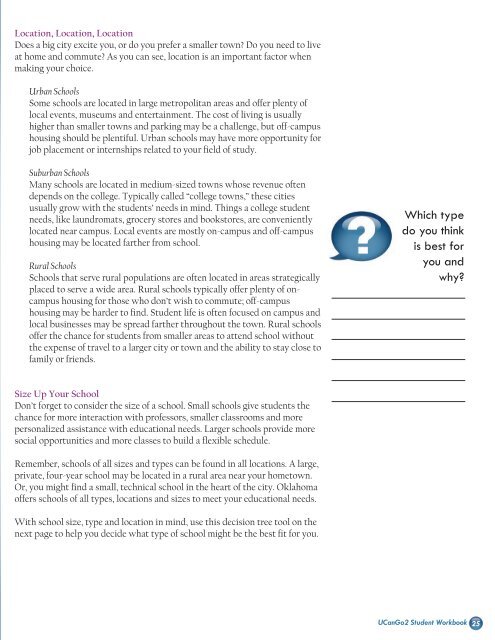You also want an ePaper? Increase the reach of your titles
YUMPU automatically turns print PDFs into web optimized ePapers that Google loves.
Location, Location, Location<br />
Does a big city excite you, or do you prefer a smaller town? Do you need to live<br />
at home and commute? As you can see, location is an important factor when<br />
making your choice.<br />
Urban <strong>School</strong>s<br />
Some schools are located in large metropolitan areas and offer plenty of<br />
local events, museums and entertainment. The cost of living is usually<br />
higher than smaller towns and parking may be a challenge, but off-campus<br />
housing should be plentiful. Urban schools may have more opportunity for<br />
job placement or internships related to your field of study.<br />
Suburban <strong>School</strong>s<br />
Many schools are located in medium-sized towns whose revenue often<br />
depends on the college. Typically called “college towns,” these cities<br />
usually grow with the students’ needs in mind. Things a college student<br />
needs, like laundromats, grocery stores and bookstores, are conveniently<br />
located near campus. Local events are mostly on-campus and off-campus<br />
housing may be located farther from school.<br />
Rural <strong>School</strong>s<br />
<strong>School</strong>s that serve rural populations are often located in areas strategically<br />
placed to serve a wide area. Rural schools typically offer plenty of oncampus<br />
housing for those who don’t wish to commute; off-campus<br />
housing may be harder to find. <strong>Student</strong> life is often focused on campus and<br />
local businesses may be spread farther throughout the town. Rural schools<br />
offer the chance for students from smaller areas to attend school without<br />
the expense of travel to a larger city or town and the ability to stay close to<br />
family or friends.<br />
Size Up Your <strong>School</strong><br />
Don’t forget to consider the size of a school. Small schools give students the<br />
chance for more interaction with professors, smaller classrooms and more<br />
personalized assistance with educational needs. Larger schools provide more<br />
social opportunities and more classes to build a flexible schedule.<br />
Remember, schools of all sizes and types can be found in all locations. A large,<br />
private, four-year school may be located in a rural area near your hometown.<br />
Or, you might find a small, technical school in the heart of the city. Oklahoma<br />
offers schools of all types, locations and sizes to meet your educational needs.<br />
With school size, type and location in mind, use this decision tree tool on the<br />
next page to help you decide what type of school might be the best fit for you.<br />
Which type<br />
do you think<br />
is best for<br />
you and<br />
why?<br />
<strong>UCanGo2</strong> <strong>Student</strong> <strong>Workbook</strong><br />
25






